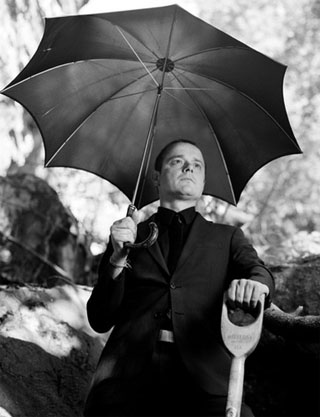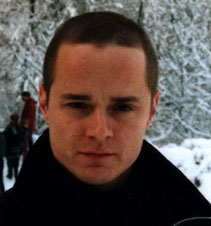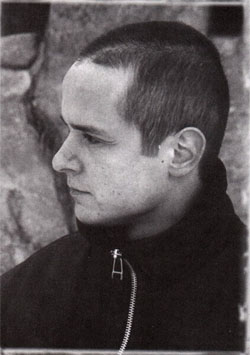When it comes to Swedish symphonic metal icons Therion, the name of Christofer Johnsson is the first to come to mind. Indeed, it is Christofer who is behind most of Therion’s success, writing most of the music and firmly guiding the diverse and everchanging cast of musicians through thick and thin in the past 20 years. However, there are a few other persons instrumental in the band’s success, and one of them is Thomas Karlsson who has been writing lyrics for Therion since the mid 1990s. Most of the times Thomas is away from the music fans’ eyes, he never goes on stage with the band and interviews with him are scarce, to say the least. But his name is widely known in another area – Thomas is the founder of the magical order Dragon Rouge, and a prominent scientist who has released several books on such themes as interpretation of runes and goetic magic. Knowing that he is quite a secluded figure, we never even attempted to get in contact with the man, even though the lyrics of such Therion albums as “Lemuria / Sirius B” (2004) and “Gothic Kabbalah” (2007) literally scream for an interview with their author. But an opportunity came up suddenly, when Karlsson’s book “Alduruna, or Goetic Kallabah” was translated into Russian and published domestically. Thus, here we go…
 It’s known that you first met Christofer Johnsson in 1990, but only started writing lyrics for Therion a few years later. What was the starting point of your creative cooperation, and what were the reasons for you to start writing lyrics to Christofer’s music?
It’s known that you first met Christofer Johnsson in 1990, but only started writing lyrics for Therion a few years later. What was the starting point of your creative cooperation, and what were the reasons for you to start writing lyrics to Christofer’s music?
Christofer asked me if I would like to write the lyric since the lyrics already dealt with themes I was deeply involved in. He thought that I maybe better could transform these themes into lyrics. We have been close friends all these years, we have a close cooperation and discuss which themes that could be suitable to the different songs.
I’ve heard from Russian metal bands working with “outside” lyricists that it’s a very difficult job to fit music and lyrics together, so they often have to rewrite lyrics from start to finish to achieve a result that satisfies both parties. How many versions of a lyric do you usually write for a Therion song?
It is a lot of work, and it is hard to say anything generally about how long time it takes, but I start with a rough version and put final touches to it until it is finished. There are many steps, first getting to know the song and its special character, and then find a suitable theme and from that put word to it and make the fit the music.
You once said, “The lyric and the music originate from the same well, which is myth and magic.” In this sense, do you consider yourself more of a creator of something new or more of a medium which only helps bring to this world something that already exists elsewhere?
I would rather say that I mediate themes already out there, but of course with a personal creative touch.
How much do you follow the present situation in heavy metal? And are there lyricists in metal music whose works you consider interesting or inspiring?
I have many friends playing in metal bands, but I'm unfortunately not very well-informed, but I know there are many talented musicians and lyric writers in the scene. Swedish band Saturnalia Temple is founded by friends and members of the esoteric order Dragon Rouge. Both their music and their lyrics are advanced and deeply impressed by magic. I have written one piece of lyric to the Swedish death/black metal band Nefandus, and this band is also very hardcore in magic.
There are quite many metal bands who proclaim that they are expressing occultism through their music and lyrics. Of course, for many it is just fashion, childish interest or stupidity, but there are some bands which are, at least, at the first glance, sincere in what they do. What are the bands that deal with occult themes and are convincing to you? What do you think about, for instance, Greece’s Necromantia?
I don't know the background of the majority of bands and it is hard to have an opinion, but Necromantia seems to be serious and advanced esoteric practitioners, as well as great musicians.
Therion is mostly associated with Christofer, while you stay behind the scenes, though your input in Therion’s albums is obviously very sizeable. What do you feel when you go to a Therion concert (by the way, how often does it happen?), and see the whole hall singing along, “Powers of Thagirion / Watch the Great Beast to be…”?
It is quite rare that I go to concerts but it is of course flattering to see all these enthusiastic Therion fans singing along to my lyrics.
Do you care how your lyrics are perceived and interpreted by the audience? Is there a special “message” or “idea” that you try to convey through the songs? Would it be correct to say that one of the purposes of your involvement in Therion is to make more people interested in magic/occultism/philosophy?
No, I don't try to promote any special philosophy through the lyrics, but I hope to inspire interest in the topics I create the lyrics from. I know that quite many from the Therion audience have been inspired to study mythology and esotericism because of the lyrics.
 On “Sirius B” there are two songs where prominent Russian figures are mentioned. Let’s start with “The Voyage of Gurdjieff” - what do you think of this person and his philosophy? Did he have any influence on you?
On “Sirius B” there are two songs where prominent Russian figures are mentioned. Let’s start with “The Voyage of Gurdjieff” - what do you think of this person and his philosophy? Did he have any influence on you?
Some parts og Gurdjieff’s philosophy have had an influence upon me. I share his idea of self-creation, self-development and awakening through work. I find his works such as “Beelzebub's Tales to His Grandson”, “Meetings with Remarkable Men” and “Life is Real Only Then, When 'I Am'” great reading, although I have got most out of his philosophy from his disciple P. D. Ouspensky. I am however not a follower of the Fourth Way, as his system is called, but I find a lot of things valuable.
Another figure is Rasputin, but my question is not about the person, but about the actual lyrics to “The Khlysti Evangelist”. I’m sorry to say this, but the Russian lines in the beginning of the song are not very accurate, so to say, and as far as I know, they were translated by a girl from Estonia, where Russian is not a common language anymore. Why such a strange choice of translator? Both you and Christofer are very demanding to the people working with you most of the time…
I'm sorry to hear that the Russian part of that lyric is not very accurate. I have no answer to that because I wasn't involved in the recording or the choice of translator. But thank you for the information. Next Russian lines on a Therion album will hopefully be more accurate.
To continue the Russian theme - February will see the publication of your book “Adulrunan och den Gtiska Kabbalan” in the Russian language for the first time. How much will this book help those left puzzled by the lyrics to Therion’s “Gothic Kabbalah” album to find answers to their questions? How much in common do the book and the album have?
The book and the lyrics are deeply connected and rooted in the same source. The book will be the key to understand the lyrics on the “Gothic Kabbalah” album. The book and the lyrics derive from the occult philosophy of the Swedish court magician Johannes Bureus (1568 - 1652). He was the teacher of the warrior king Gustav II Adolf and created a system he called a "gothic kabbalah". According to him, the Gothic tribes originated from Scandinavia and he meant that the runes could be interpreted as kabbalistic signs describing the very foundation of universe. There are many riddles in his system. Inspired by the Swiss alchemist Paracelsus he meant that there are three treasures to be found and that they will transform the entire world when someone find them. He probably meant this symbolically as spiritual treasures.
How do you see the audience of your books? In other words, whom would you recommend to read them?
It is a quite academic book, but I think that everyone that would like to understand the lyrics on “Gothic Kabbalah” must read it, and I believe that people interested in occultism and/or history will find it interesting. It is however not a practical esoteric book, as my book Qabalah, Qliphoth and Goetic Magic which describe seals, rituals and practical magical work.
There is a common belief that true magic should remain clandestine, and if it’s brought to the public spotlight, magic loses its power. You, on the contrary, write about magic in detail in “Qabalah, Qliphoth and Goetic Magic”. Do you disagree with the statement above, or is what you write about in this book just the initial stage, and more advanced stages need to be kept in secrecy?
I believe that true magic is clandestine in itself. It doesn't matter if you talk or write about it because its very effect is below the surface of common knowledge. I don't believe there is any point in keeping it secret as a goal in itself. It takes years of dedication to get into the secrets of magic, and my role as author is to help the dedicated adepts to find the path to the secrets of magic, but the revelation and illumination itself is nothing I can influence. It is a process inside the person.
Apart from Therion, you have been involved in the band Shadowseeds, which you call “a musical manifest of some parts of our magical work”. Can you describe the music of this project or recommend ways of getting to hear it (apart from downloading mp3s from the web, of course)?
It is a magical music project together with Tommie Eriksson, my friend and frater of Dragon Rouge. It is a passive project and it appears when it is connected to certain esoteric processes. Last time it was together with a long working with the gothic kabbalah of Bureus, and Shadowseeds made it manifest in music. My first lyrics based on Gothic Kabbalah was on a Shadowseeds production. The best way to listen to the music is to find Tommie on MySpace. He is the driving force behind Lapis Niger and Saturnalia Temple.
It’s been a long time since Shadowseeds manifested any activity (studio or live). Is there any chance that you will revive this project any time soon, or engage in any other musical collaboration?
We will for sure create new music, but we don't know when. It is a magical project and in many ways out of our conscious control. But I believe the next album will appear not too far away in time.
What music do you prefer to listen to at home? Is it heavy metal, is it something similar to Shadowseeds in style, or anything else?
I listen to many kinds of music. I enjoy early black metal such as Bathory, and esoteric metal such as Dio. I am very fond of the early albums from Mercyful Fate and King Diamond. I listen to music from friends and magical fraters such as Saturnalia Temple and Kaamos. When I'm writing I listen to dark ambient bands such as Arcana and Raison d'Etre and I like to listen to bands such as Ain Soph, Blood Axis and Fire + Ice. I enjoy classical music, and it will sound as I'm trying to flatter the Russian readers, but the majority of my real favorite composers are Russian. Aleksandr Nikolajevitj Skrjabin is one of my absolute favorite composers, but I'm also really fond of the music of Stravinskij, and all of The Five (Csar Cui, Alexander Borodin, Modest Musorgskij, Nikolaj Rimskij-Korsakov and Milij Balakirev). I also listen a lot to folk music and especially like oriental folk music. And I must confess secretly that I some times listen to contemporary commercial music, although I try to deny it. (smiles)
The power of music has been a subject of discussion for a long time. In the Middle Ages there was this “diabolus en musica” concept, in the early 1990s there was a trial against Judas Priest, and so on. In your opinion, how much power does music have? Is it possible to intentionally influence someone’s life or way of thinking through a song or a progression of chords/sounds?
The power of music cannot, according to my worldview, be overestimated. Music is the strongest argument for a non-nihilistic and non-Darwinistic worldview. Music can't be explained through simple Darwinism. Music is irrational, but at the same time fundamental for being a human. Music has the power to open gates to other realities and music can create revolutions and war, as well as love and peace. I share the ancient Pythagorean philosophy that universe is in its foundation musical.
 Going back to the issue of Russia - you once said that you were very interested in Slavonic mythology. What do you think about present-day Russia? Have you ever been in this country?
Going back to the issue of Russia - you once said that you were very interested in Slavonic mythology. What do you think about present-day Russia? Have you ever been in this country?
I have unfortunately never been to Russia, but I will for sure go to Russia in the near future. I am very fond of Russian culture and hope to learn more about Russian myths and traditions.
How many Russian members does Dragon Rouge have? Are there any plans of building a temple in Russia or any other Slavonic country?
I don't know. As I am the founder of Dragon Rouge, some fraters have been kind and released me from some of the administrational duties, but I don't think we have many members yet, although I think that the books will change that and I hope we soon get more Russian members. As soon as we have a solid foundation we would like to build a temple in Russia and in other Slavonic countries.
Speaking about plans - it has been reported that Therion will start recording a new album in 2009. What topics will the songs deal with this time?
It is still a secret.
And what do you personally plan to be occupied with in the near future? Are there any new books in the works? Maybe a book about Lilith, as you mentioned in an interview some years ago?
I am about to finish my Ph.D. at the University of Stockholm, and my next book is probably a semibiographic book about my early occult experiences, but I don't know exactly yet, there might be another book before that one.
To round off this interview, can you say something to the readers of HeadBanger.ru and to the potential readers of upcoming Russian translations of your books?
I hope you enjoy what you read and I'll maybe meet some of you in the future.
---
Special thanks to Warrax (Darkhon Publishing) for arranging this interview
Roman ”Maniac” Patrashov
February 20, 2009 2009
(c) HeadBanger.ru




